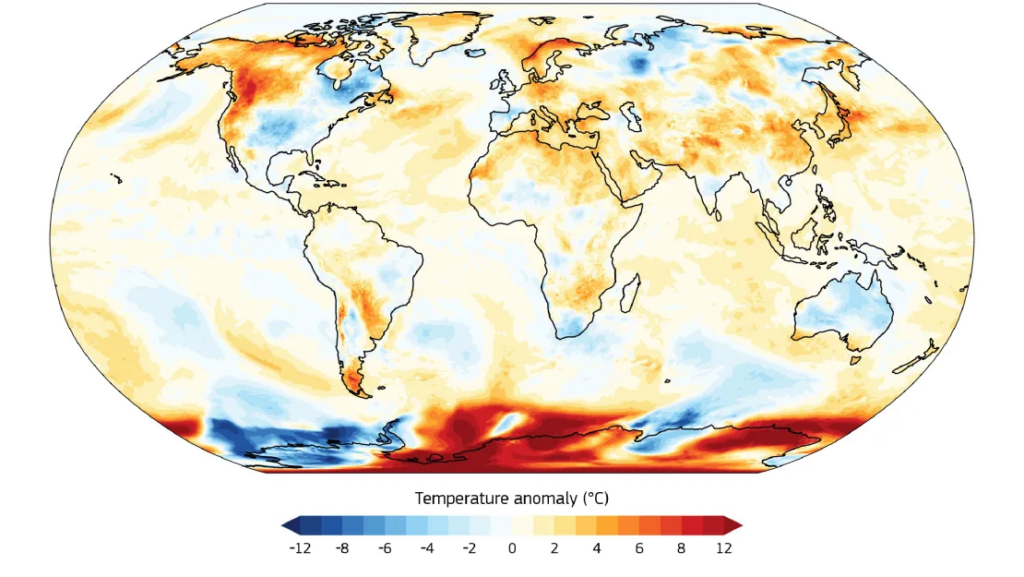Sunday was the hottest day in recorded history, according to preliminary data from a climate tracking agency monitoring temperatures since the mid-1900s.
It’s the second consecutive year average global temperatures have crashed through shocking climate records and will not be the last, as planet-warming fossil fuel pollution drives temperatures to shocking new highs.
July 21 clocked in at 17.09 degrees Celsius, or 62.76 Fahrenheit, and was the hottest day on Earth since at least 1940, according to the preliminary data from the European Union’s Copernicus Climate Change Service.
Global average temperatures typically peak during the Northern Hemisphere summer, between late June and early August.
Sunday’s record came as many countries endure prolonged and brutal heat waves. Around a hundred cities across the US are experiencing their hottest start to summer on record, and swaths of southern Europe have been grappling with triple-digit temperatures.
Despite being based on data from the mid-20th century, the temperature records represent the warmest period the planet has seen in at least 100,000 years, scientists have found from many millennia of climate data extracted from ice cores and coral reefs.
Global climate records are typically broken by tiny fractions of a degree, as was the case with this one: Sunday’s temperature was just 0.01 degrees Celsius above 2023’s record.

C3S/ECMWF
What’s jarring is the warmest global temperatures were significantly cooler by about 0.3 degrees before 2023.
“We are now in truly uncharted territory and as the climate keeps warming, we are bound to see new records being broken in future months and years,” said Carlo Buontempo, director of Copernicus.
These recent records are “truly staggering,” Buontempo said.

“We are now in truly uncharted territory and as the climate keeps warming, we are bound to see new records being broken in future months and years.”
Global temperatures fluctuate based on natural factors: seasons, large-scale climate patterns and solar activity — and on unnatural factors: the pollution from human activity, including the burning of fossil fuels, which is chiefly driving the planet’s temperature steadily upward.
Scientists pegged last year’s record to the coincidence of El Niño, a natural climate pattern in the Pacific ocean with a warming effect, and fossil fuel pollution, which is trapping heat in the Earth’s atmosphere.
This year’s record comes as El Niño is disappearing and transitioning to its cool La Niña phase, underscoring the significant influence of the human-caused climate crisis.
The sudden rise in global temperatures is linked to abnormal heat in large parts of Antarctica, according to the Copernicus analysis. The rapid warming of this vast, icy continent is a trend that is alarming scientists given the region’s ability to drive catastrophic sea level rise.
Latest Stories
-
“This is not a witch-hunt” – Keta MCE urges calm as probe into reclaimed lands begins
3 minutes -
Ghana’s cedi appreciation: Causes, consequences, and policy imperatives
5 minutes -
Robert Klah apologises to Felicia Osei over TGMA ticket issues
7 minutes -
Speak Up Africa galvanises private sector engagement to accelerate malaria-elimination efforts in Africa
18 minutes -
Power crisis: We need $1.1bn to procure liquid fuel alone – Energy Minister
37 minutes -
26Tth TGMA: Spectacle, sound, soul and a sprinkle of chaos
40 minutes -
Railway strike hits vendors hard as livelihoods hang in the balance
1 hour -
GACC calls for collective action to tackle corruption in Ghana
1 hour -
Fare Thee Well “The Bulldozer” Of Ghana Football
1 hour -
Belief vs. Redemption: The Women’s FA Cup Final showdown
1 hour -
Non-traditional export dips by 2.87% in 2024 — GEPA
1 hour -
I was high on marijuana the first time I entered church – Archbishop Agyinasare shares salvation story
1 hour -
Ag. NPA CEO engages tanker drivers in Western Region, unveils measures to address industry challenges
1 hour -
Don’t take for granted what Ghanaians did for you – Archbishop Agyinasare advises Mahama
2 hours -
Gov’t pushes for private sector role in power distribution to boost revenue efficiency
2 hours

